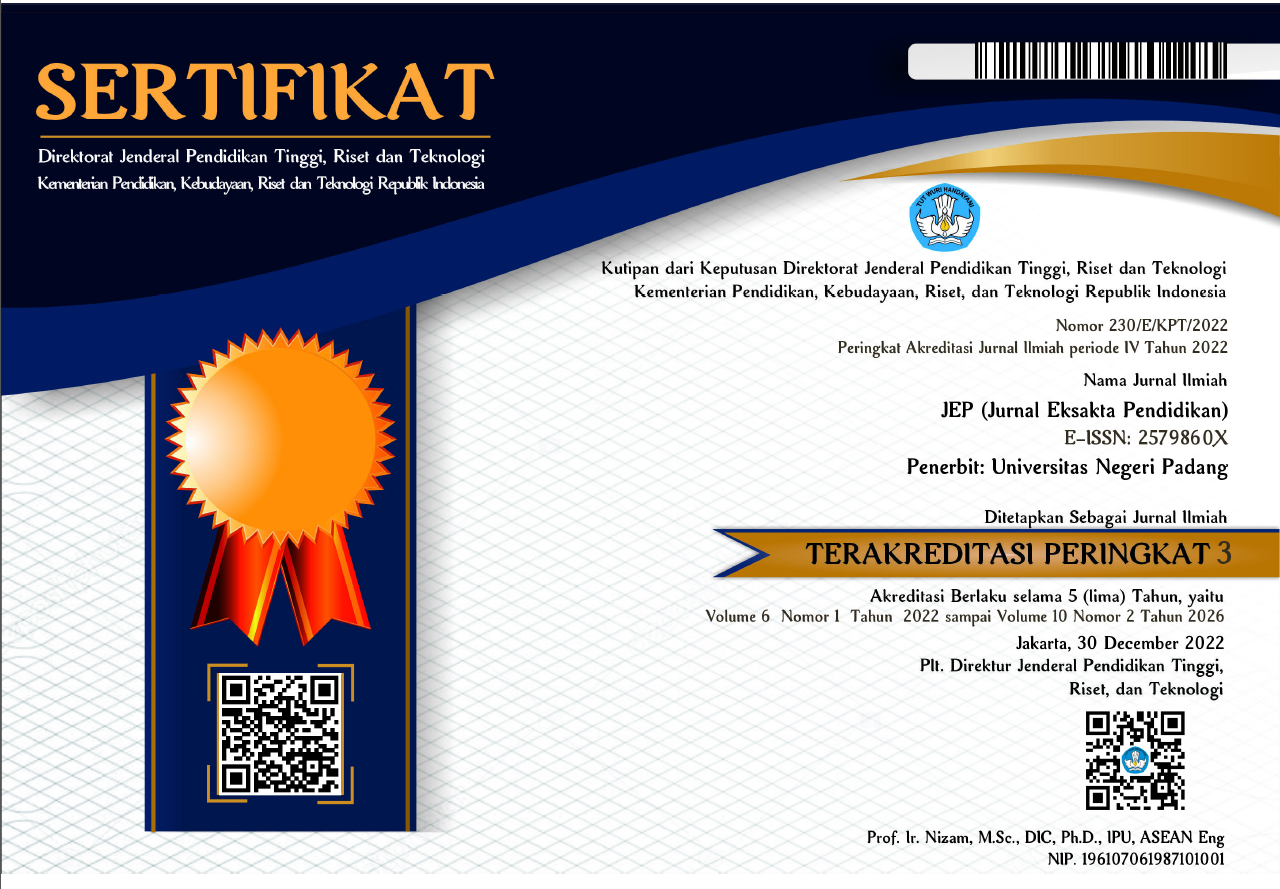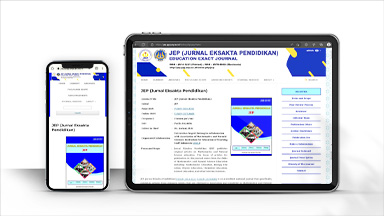Kemampuan Dosen dalam Membuat Soal HOTS Pada Pembelajaran Abad 21
Abstract
Twenty-first century learning requires high-level thinking skills including critical thinking, communication, collaboration, and creativity known as the 4Cs. The purpose of this study was to determine the ability of the lecturers of the Biology Education Study Program at UIN Alauddin Makassar in making Higher Order Thinking Skills (HOTS) questions and to find out the responses of the lecturers of the Biology Education Study Program at UIN Alauddin Makassar on the importance of developing HOTS questions. This research is a quantitative descriptive research. This research was carried out in the odd semester of the 2019/2020 Academic Year with the research subjects of all lecturers of the Biology Education Study Program at UIN Alauddin Makassar who have educational backgrounds according to the study program as many as 12 people. Data collection techniques through question documentation and questionnaires. Data were analyzed by descriptive statistics. The results showed that Lecturers of the Biology Education Study Program were able to make higher order thinking questions (HOTS) with a percentage of 33% Very Able, 8% Able, and 17% Enough, while the remaining 42% with the criteria of Poor. As many as 85% of the Lecturers of the Biology Education Study Program at UIN Alauddin Makassar gave a positive response to 74% of items stating the importance of making higher order thinking questions (HOTS). Suggestions from this study was that Biology Education lecturers can innovate HOTS-based educational evaluations.
Downloads
References
Abidinsyah, A., Ramdiah, S., & Royani, M. (2019). The Implementation of Local Wisdom-Based Learning and HOTS-Based Assessment: Teacher Survey in Banjar masin. JPBI (Jurnal Pendidikan Biologi Indonesia), 5(3), 407–414.
Anagun, S. S. (2018). Teachers’ Perceptions About The Relationship Between 21st Century Skills and Managing Constructivist Learning Environments. International Journal of Instruction, 11(4), 825–840.
Anderson, L. W., Krathwohl, D. R., Airiasian, W., Cruikshank, K. A., Mayer, R. E., Pintrich, P. R., Raths, J., & Wittrock, M. C. (2001). A Taxonomy for Learning, Teaching and Assessing: A Revision of Bloom’s Taxonomy of Educational Objectives. Longman.
Ariyana, Y., Bestary, R., Yogyakarta, U. N., & Mohandas, R. (2018). Buku Pegangan Pembelajaran Berorientasi pada Keterampilan Berpikir Tingkat Tinggi. Direktorat Jenderal Guru dan Tenaga Kependidikan.
Bruehl, M., Pan, D., & Ferrer-Vinent, I. J. (2015). Demystifying the Chemistry Literature: Building Information Literacy in First-Year Chemistry Students Through Student-Centered Learning and Experiment Design. Journal of Chemical Education, A-F.
Dewi, N., & Riandi, R. (2016). Analisis Kemampuan Berpikir Kompleks Siswa Melalui Pembelajaran Berbasis Masalah Berbantuan Mind Mapping. Edusains UIN Syarif Hidayatullah, 8(1), 98–107.
Dubas, J. M., & Toledo, S. A. (2016). Taking Higher Order Thinking Seriously: Using Marzano’s Taxonomy in The Economics Classroom. International Review of Econo mics Education, 21, 12–20.
Fanani, M. Z. (2018). Strategi Pengembangan Soal Hots pada Kurikulum 2013. Edudeena, 2(1), 57-76.
Farisi, M. I. (2016). Developing The 21 St-Century Social Studies Skills Through Technology Integration. Turkish Online Journal of Distance Education-TOJDE, 17(1), 16–30.
Gülbahar, Y., & Tinmaz, H. (2006). Implementing Project-Based Learning and E-Portfolio Assessment in an Under graduate Course. Journal of Research on Technology in Education, 38(3), 309–327.
Gunawan, A. W. (2003). Genius Learning Strategy: Petunjuk Praktis untuk Menerap kan Accelerated Learning. Jakarta: PT Gramedia Pustaka Utama.
Hacieminoglu, E. (2016). Elementary School Students’ Attitude Toward Science and Related Variables. International Journal of Environmental and Science Education, 11(2), 35–52.
Heinrichs, C. R. (2016). Exploring the Influence of 21st Century Skills in a Dual Language Program: A Case Study. International Journal of Teacher Leadership Heinrichs - Exploring the Influence, 37(1), 37–56.
Heong, Y. M., Yunos, J., Othman, W., Hassan, R., Kiong, T. T., & Mohamad, M. M. (2012). The Needs Analysis of Learning Higher Order Thinking Skills for Generating Ideas. Procedia - Social and Behavioral Sciences, 59, 197–203.
Ichsan, I. Z., & Rahmayanti, H. (2020). HOTSEP: Revised Anderson’s Taxonomy in Environmental Learning of COVID-19. European Journal of Educational Research, 9(3), 1257–1265.
Ichsan, I. Z., Sigit, D. V., Miarsyah, M., Ali, A., Arif, W. P., & Prayitno, T. A. (2019). HOTS-AEP: Higher Order Thinking Skills From Elementary To Master Students in Environmental Learning. European Jour nal of Educational Research, 8(4), 935–942.
Isbandiyah, S., & Sanusi, A. (2019). Modul Penyusunan Soal Keterampilan Berpikir Tingkat Tinggi (Higher Order Thinking Skills) (L. Hhadi (ed.)). Direktorat Pembinaan Sekolah Menengah Atas.
Kinslow, A. T., Sadler, T. D., & Nguyen, H. T. (2018). Socio-Scientific Reasoning and Environmental Literacy in A Field-Based Ecology Class. Environmental Education Research, 4622, 1–23.
Lailly, N. R., & Wisudawati, A. W. (2015). Analisis Soal Tipe Higher Order Thinking Skill (HOTS) dalam Soal UN Kimia SMA Rayon B Tahun 2012/2013. Jurnal Kaunia, 11(1), 27–39.
Lee, A. Y. L. (2016). Media Education in The School 2.0 Era: Teaching Media Literacy Through Laptop Computers and Ipads. Global Media and China, 1(4), 435–449.
Miarsyah, M., Rusdi, R., Aryani, N. D., & Ichsan, I. Z. (2019). MEBA: Development Android-Based Ecosystem Module for Senior High School Students. Indian Journal of Public Health Research and Development, 10(8), 2114–2118.
Muhlisin, A., Susilo, H., Amin, M., & Rohman, F. (2016). Improving Critical Thinking Skills of College Students Through RMS Model For Learning Basic Concepts in Science. Asia-Pacific Forum on Science Learning and Teaching, 17(1), 1–24.
Nofiana, M. (2015). Kualitas Penulisan Butir Soal Ujian Nasional Biologi Tahun 2014/2015 ditinjau dari aspek teoritik. Saintifika, 17(1), 1-13.
Nursalam. (2012). Pengukuran dalam Pendidik an. In M. Malik (Ed.), Yogyakarta: Pustaka Pelajar (1st ed., Vol. 1, Issue 2). Alauddin University Press.
Nursalam, N. (2014). Statistika dan Pengukuran untuk Guru dan Dosen: Teori dan Aplikasinya dalam Bidang Pendidikan. Alauddin Unuversity Press.
Pratiwi, I. H. (2015). Kemampuan Guru Mata Pelajaran Ipa Dalam Pembuatan Soal HOT (Higher Order Thinking) Dan Kesesuaian Penulisan Soal Di Smp Negeri 1 Kragan Rembang. Universitas Muhammadiyah Surakarta.
Priantari, I., Prafitasari, A. N., Kusumawardhani, D. R., & Susanti, S. (2020). Improving Students’ Critical Thinking through STEAM-PjBL Learning. Bioeducation Journal, 4(2), 95–103.
Quieng, M. C., Lim, P. P., & Lucas, M. R. D. (2015). 21st Century-Based Soft Skills: Spotlight On Non-Cognitive Skills In A Cognitive-Laden Dentistry Program. Euro pean Journal of Contemporary Education, 11(1), 72–81.
Quiroga, M. D. M., & Choate, J. K. (2019). A Virtual Experiment Improved Students’ Understanding of Physiological Experimen tal Processes Ahead Of A Live Inquiry-Based Practical Class. Advances in Physio logy Education, 43(4), 495–503.
Sadiqin, I. K., Santoso, U. T., & Sholahuddin, A. (2017). Students’ Difficulties on Science Learning With Prototype Problem-Solving Based Teaching And Learning Material : A Study Evaluation of Development Research. Advances in Social Science, Education and Humanities Research, 100, 279–282.
Saputri, A. C., Sajidan, S., Rinanto, Y., Afandi, A., & Prasetyanti, N. M. (2019). Improving Students’ Critical Thinking Skills in Cell-Metabolism Learning Using Stimulating Higher Order Thinking Skills Model. International Journal of Instruction, 12(1), 327–342.
Savery, J. R. (2006). Overview of Problem-Based Learning: Definition and Distinctions, The Interdisciplinary. Journal of Problem-Based Learning, 1 (1), 9-20.
Sigit, D. V., Azrai, E. P., Heryanti, E., Ichsan, I. Z., Jajomi, Y. P., & Fadrikal, R. (2019). Development Green Consumerism E-Book for Undergraduate Students (Gc-Ebus) as Learning Media in Environmental Learning. Indian Journal of Public Health Research and Development, 10(8), 2026–2031.
Subali, B. (2010). Penilaian, Evaluasi dan Remediasi Pembelajaran Biologi. Jurusan Pendidikan Biologi Fakultas Matematika Dan Ilmu Pengetahuan Alam Universitas Negeri Yogyakarta: Yogyakarta.
Suharini, E., Kurniawan, E., & Ichsan, I. Z. (2020). Disaster Mitigation Education in the COVID-19 Pandemic: A Case Study in Indonesia. Sustainability (United States), 13(6), 292–298.
Winarno, S., Muthu, K. S., & Ling, L. S. (2017). Direct Problem-Based Learning (DPBL): A Framework For Integrating Direct Instruc tion And Problem-Based Learning Approach. International Education Studies, 11(1), 119–126.
Yee, M. H., Yunos, J. M., Othman, W., Hassan, R., Tee, T. K., & Mohamad, M. M. (2015). Disparity of Learning Styles and Higher Order Thinking Skills among Technical Students. Procedia - Social and Behavioral Sciences, 204(November 2014), 143–152.
Copyright (c) 2021 Ahmad Ali, Wiwin Pramita Arif, Ilmi Zajuli Ichsan, Diana Vivanti Sigit, Rahmawati Darussyamsu, Dasmo Dasmo, Nurfadhilah Nurfadhilah, Nur Fadli Hazhar Fachrial

This work is licensed under a Creative Commons Attribution 4.0 International License.

This work is licensed under a Creative Commons Attribution 4.0 International License.




_(2579-860X).png)
_(2614-1221)1.png)




